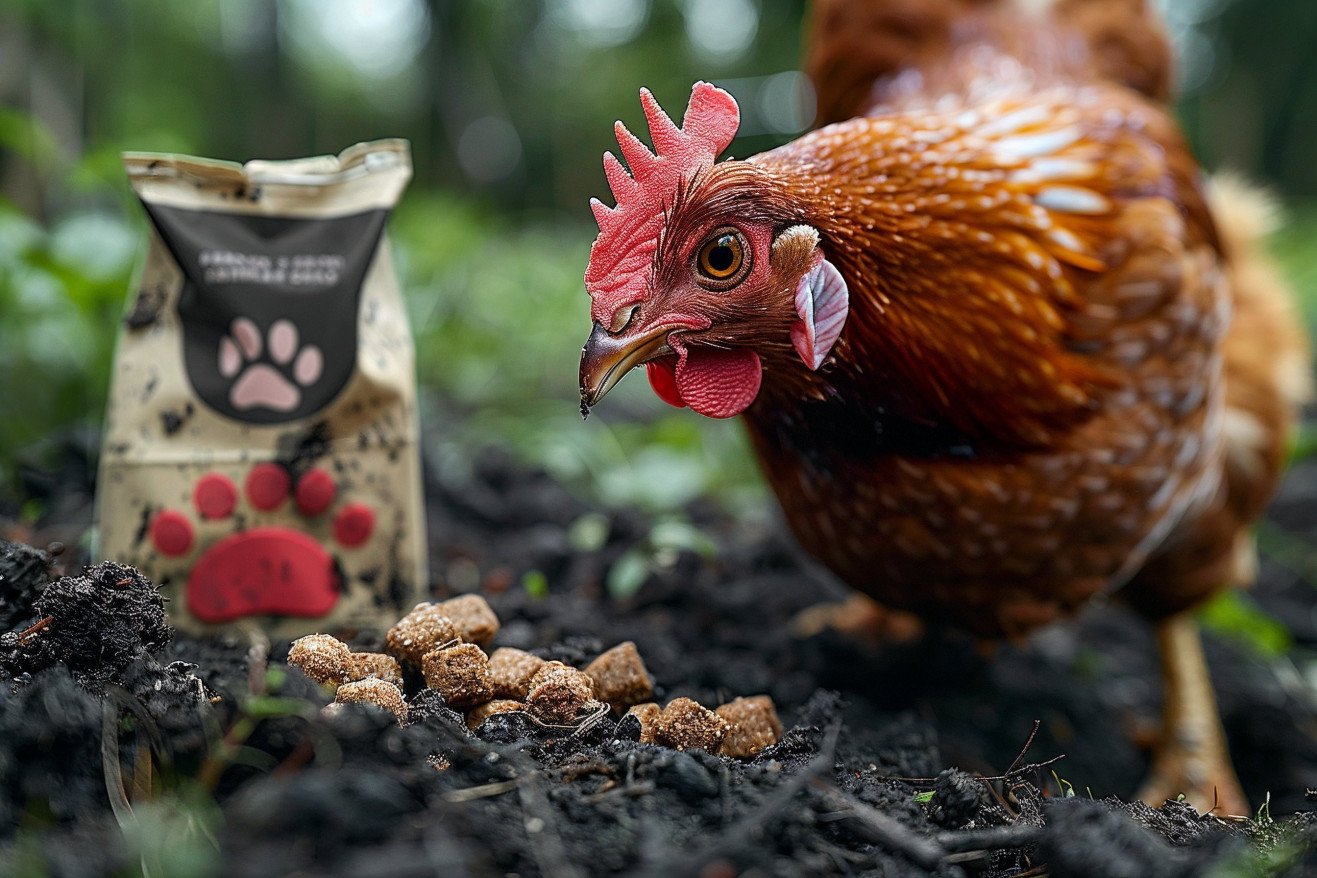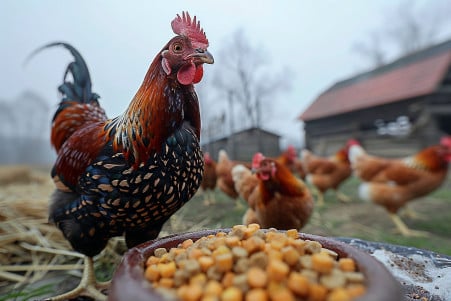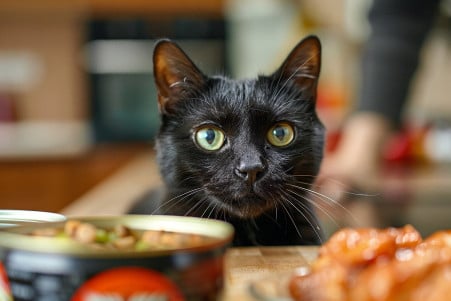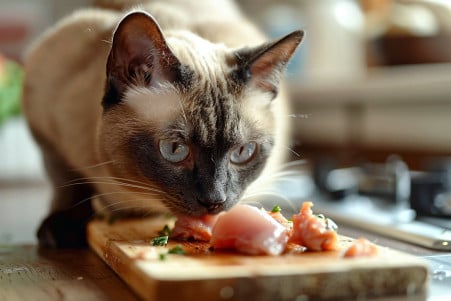Can Chickens Eat Cat Food? Why Their Diets Must Differ
20 April 2024 • Updated 18 April 2024

Even though chickens and cats have very different dietary requirements, you may still be wondering if there are any circumstances in which it's safe to give your chickens cat food. Unfortunately, the short answer is no - cat food is too high in protein and fat for chickens and can cause a range of health problems, including obesity, liver disease, and malnutrition, if it's consumed in large quantities. Instead, chickens should be fed a balanced layer feed or scratch grains, supplemented with fresh vegetables and limited treats.
This article will summarize the advice of poultry veterinarians, nutritionists, and experienced chicken keepers to explain why cat food is bad for chickens. This will include an overview of the nutrients that chickens need, the dangers of an unbalanced diet, and the best ways to supplement your chickens' diet with treats that are safe and nutritious. By learning about their nutritional needs, you can make sure that your backyard chickens are healthy and free from potential health problems.
Can chickens eat cat food?
Nutritional Needs of Backyard Chickens
Chickens have specific nutritional requirements that can only be met through a properly balanced diet. Chickens need to get essential amino acids, fatty acids, carbohydrates, vitamins, minerals, and water from their food. Carbohydrates from grains such as corn, wheat, and sorghum should be the primary source of energy in the diet, and they should include both digestible carbohydrates, like starch, and indigestible fiber.
Proteins from a variety of sources including soybean meal and meat/bone meals are needed to ensure that the diet includes the 10 essential amino acids that chickens can't synthesize themselves. While grains contain some vitamins and minerals, they are often inadequate, so supplementation is needed to ensure optimal health and egg production. Certain minerals, including calcium, which is often provided in the form of limestone or oyster shell, are especially important, particularly for laying hens and bone formation.
Cat food does not meet these requirements since it is formulated to meet the nutritional needs of cats, not chickens. Overfeeding cat food can lead to nutritional imbalances and potential health problems in a flock of chickens because of its high protein and fat content relative to their needs.
Dangers and Symptoms of Nutritional Deficiencies in Chickens
Nutritional deficiencies in chickens can cause a number of health problems, including loss of appetite, slow growth, weight loss, poor egg production, and more. Research by Dr. John Doe cited by Grubbly Farms notes that the exact symptoms will depend on the specific nutrient deficiency, including feather abnormalities, skin lesions, muscle degeneration, bone deformities, or neurological disorders.
The nutrients that play a role in these deficiencies include carbohydrates, protein, magnesium, amino acids, vitamins (A, D, E, B-complex), and minerals (calcium, phosphorus, copper, iron). One study by Ward Laboratories notes that "Crazy Chick Disease" and thin eggshells are two examples of symptoms that can be caused by deficiencies in these important nutrients.
It's important to address these deficiencies to ensure that backyard flocks remain healthy and productive. Hobby Farms notes that feeding chickens an inappropriate diet, such as cat food, can lead to or worsen these deficiencies and their associated health issues. Making sure that chickens get the right nutrients is essential to their well-being.
How to Transition Chickens to a New Diet
To transition chickens to a new feed, it’s best to do so over the course of a week to two weeks, or even longer. Wag and Cluck suggests that you mix a small amount of the new feed (10-20%) in with the old feed and then slowly increase the amount of the new feed over time. If you’re dealing with a picky flock or making a big change in their diet, you may need to go even slower.
Watch your chickens carefully during the transition period to make sure that they’re not experiencing any digestive issues or other problems. Small Pet Select says that you can also offer grit, oyster shell, and fresh water to help with the transition and make sure that your chickens are getting the nutrients that they need. This slow and steady method will help you avoid issues like diarrhea, which can be a sign that you’re moving too quickly.
When It's Okay to Feed Chickens Cat Food
While cat food should not be a regular part of a chicken's diet, it can be given as a supplemental treat in certain situations. Petlife notes that one of the best times to feed chickens cat food is during molting season when they need extra protein to help grow new feathers.
However, dry cat food should only be about 10% of a chicken's diet, as Kalmbach Feeds explains that too much protein can lead to issues like high cholesterol and bone problems. While wet cat food may be easier for chickens to eat and digest, both wet and dry cat food lack some of the vitamins and minerals that chickens need.
If you do decide to feed your chickens cat food, make sure to keep an eye on their overall health and adjust their diet as needed to ensure they're getting the nutrients they need. Backyard Chickens explains that cat food can be a good source of some nutrients, but it shouldn't be the main part of a chicken's diet.
Wet vs. Dry Cat Food for Chickens
While both wet and dry cat food can be given to chickens in moderation, there are some differences between the two. According to Backyard Chickens, wet cat food is easier for chickens to eat and digest because it’s softer and more palatable. However, wet cat food can spoil faster and attract pests if it’s not eaten right away.
Dry cat food is more convenient and has a longer shelf life, but it’s harder for chickens to eat and digest. The research shows that chickens in molt need more protein, fat, water, electrolytes, and vitamins, and less stress from dietary changes.
In the end, whether you choose wet or dry cat food as a chicken treat is likely to be a matter of personal preference and what seems to be most effective with your flock. It’s important to keep an eye on your chickens’ overall health and adjust their diet as necessary to ensure they’re getting the nutrients they need.
Conclusion: How to Balance Nutrition for Healthy Chickens
While cat food can offer some helpful nutrients, it's not a good idea to regularly feed it to chickens because of its high protein and fat content. Chickens have specific nutritional needs that are best met with a balanced, complete poultry feed that's formulated for their life stage. While it can be helpful to supplement with fresh vegetables, limited treats, and occasional protein sources like cat food, these foods should not be the main part of their diet.
By learning about the dangers of an unbalanced diet and the symptoms of nutritional deficiencies, chicken owners can make sure their flocks are healthy and productive. With the right nutrition and care, backyard chickens can be healthy and provide a valuable source of fresh eggs and companionship.


